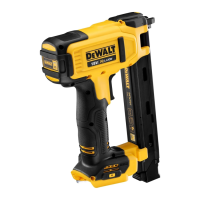12
ENGLISH
WARNING: Always assume that the tool contains staples.
Careless handling of the stapler can result in unexpected
firing of staples and personal injury. Do not point the tool
towards yourself or anyone nearby. Unexpected triggering
could discharge a staple causing an injury. No horseplay!
Work Safe! Respect the tool as a workingimplement.
WARNING: Do not actuate the tool unless the tool is
placed firmly against the workpiece. If the tool is not in
contact with the workpiece, the staple may be deflected
away from yourtarget.
There is no need for depthadjustment.
1. Load unit withstaples.
2. Place battery intotool.
3. Locate cable alignment guide
3
directly over the cable or
wire you wish to staple so that the wire is centered as much
as possible between the 2 prongs of the cableguide.
WARNING: Staples must be driven straight into the
material. Do not tilt stapler while driving staples. Refer to
Figure G. Staple retention values improve when tool is fired
perpendicular to thematerial.
4. Push tool against cable firmly to depress cable alignment
guide
3
all the way as well as wire indicator
4
, pull
trigger
1
and a staple will befired.
5. Check wire for damage after eachshot.
NOTE: When fastening into certain wood materials, additional
force applied towards the wood may be needed to properly
seat thestaple.
WARNING: Use caution in locating stapler over cable or
wire to prevent the staple from piercing the cable jacket or
insulation. After firing each staple, visually inspect driven
staple to make sure wire insulation was not damaged. If
damaged replacewire.
Clearing a Jammed Staple (Fig. A, H)
WARNING: To reduce the risk of serious personal injury,
disconnect battery pack from tool before making any
adjustments, changing accessories, servicing, or moving
the tool. Such preventative safety measures reduce the risk
of firing the tool accidentally.
1. Remove battery pack
10
fromtool.
2. Depress magazine latch
7
and slide the magazine core and
pusher
8
out until it reaches the end of itstravel.
3. Tip the tool right side up until any loose staple strips fall
freely out of the magazine. Any jammed staples can then
beremoved.
4. Refill magazine with newstaples.
Cold Weather Operation
When operating tools at temperatures below freezing:
1. Keep tool as warm as possible prior touse.
2. Actuate the tool a few times into scrap lumber over a piece
of scrap cable beforeusing.
Hot Weather Operation
Tool should operate normally. However, keep tool out of direct
sunlight as excessive heat can deteriorate bumpers and other
rubber parts resulting in increasedmaintenance.
MAINTENANCE
Your DeWALT power tool has been designed to operate
over a long period of time with a minimum of maintenance.
Continuous satisfactory operation depends upon proper tool
care and regularcleaning.
WARNING: To reduce the risk of serious personal
injury, turn unit off and remove the battery pack
before loading staples, making any adjustments or
removing/installing attachments or accessories. An
accidental actuation can causeinjury.
The charger and battery pack are notserviceable.
DAILY MAINTENANCE CHART
ACTION
Clean magazine, pusher, and contact
tripmechanism.
WHY
Permits smooth operation of magazine, reduces
wear, and preventsjams.
HOW
Blowing off the tool with compressed air is the
most effective way to clean the tool. The use
of oils, lubricants periodically or solvents is not
recommended as they tend to attract debris
and/or damage the plastic parts of thetool.
ACTION
Before each use, check to ensure all screws and
staples are tight andundamaged.
WHY
Prevents jams and premature failure of toolparts.
HOW
Tighten loose screws using the appropriate hex
wrench orscrewdriver.
Lubrication
NOTICE: NEVER spray or in
any other way apply lubricants
or cleaning solvents inside the
tool. This can seriously affect
the life and performance of
thetool.
DeWALT tools are properly lubricated at the factory and are
ready for use. However, it is recommended that, once a year,
you take or send the tool to a certified service centre for a
thorough cleaning andinspection.

